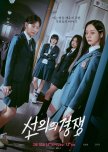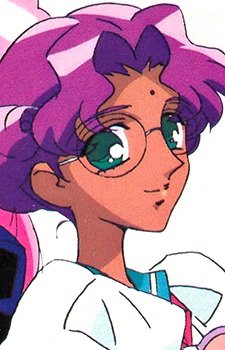
This review may contain spoilers
Messy but worth the watch
Pluto was a fun series to follow week by week, not just for the plot twists, but for the excitement of watching a creative team walk a dizzying tightrope. I haven’t read the novel by Chao Planoy, but her work tends to be controversial to say the least, and Pluto seems like an especially tricky work to adapt. It’s a more complex story than your average GL, too, mixing romance, mystery, and social commentary. And with two popular actors in the lead roles, Pluto promised to be one of the most ambitious Thai GL productions yet. Every week I found myself asking: Can they pull it off? Can Snap25 make this adaptation work?And hey, in the end, they almost did it! I don’t want to be too hard on them—by all accounts, they managed to improve on the novel quite a bit, and many of the flaws in the series are only glaring in hindsight. This is also probably the best-looking Thai GL; the cinematography and set design have an artsy flair that is often striking. The performances are excellent, not just from Namtan and Film but from the whole ensemble. Pluto can be a bumpy ride, but it’s always an entertaining and sometimes a beautiful one.
About those bumps, though. It’s tempting to blame any issues on the source material, but considering the liberties that were taken in adapting the book, I don’t think all of Pluto’s faults can be laid at the feet of Ms. Planoy. What I think Pluto might be lacking, more than anything, is a director. Technically the “Snap25 Team” is credited as director of the series, and they seem to have a very collaborative style, working closely with the actors to develop the story. That’s super cool, on one hand, and I like the egalitarian approach of crediting the whole crew. On the other hand, Pluto is a series that could really have benefited from a stronger unifying vision. Because baby the tone of this series is all OVER the place. Sometimes the drama is naturalistic and down-to-earth, and sometimes the soap opera dial is cranked up to 11. (Like in Episode 11, during the miscalculated sobfest, when May should react to being abandoned with cold fury, but instead acts like her only child was just brutally murdered in front of her eyes.) Sometimes the writing is subtle, and sometimes a character will turn to the camera and say, “That’s emotional abuse!” in a scene about emotional abuse. Sometimes there will be a musical number/dream sequence with like seven costume changes in the middle of an otherwise realistic episode. The whiplash is intense.
That lack of focus extends to the story, too. Pluto tries to be about a lot of things—disability, childhood trauma, forgiveness, atonement, justice, why you should never date a cop no matter how good she looks in that uniform—but can never really decide what matters most. As a result the themes and subplots all feel underdeveloped. Why is the Pang/Jan/Phim love triangle part of the story? Don’t get me wrong, I adore Kapook, Ciize, and Earn (especially Earn!), and honestly “lesbian polycule revolving around potted plants” sounds right up my alley, but the whole thing feels weightless. May’s lectures on disability rights and universal design are well-intentioned, but sound like the screenwriter is quoting from something they read on wikipedia, rather than like the genuine sentiments of a blind person. The script insists that blindness is not a limitation, but then awkwardly wants viewers to rejoice at the restoration of May’s sight, and even implies that her blindness was a punishment she had to endure. So many interesting contrasts and parallels between how May and Ai-oon were raised are ignored by the story, and of course the class difference between them is completely glossed over. And the Pluto metaphor!! Whatever Pluto was meant to represent in this series is beyond me.
I’m really just scratching the surface in terms of weird narrative choices: There’s the hilarious “May helps edit Ai-oon’s bad erotica” subplot which sadly gets dropped right away. There’s the dreaded redemption for May’s evil dad which comes out of nowhere. There are some confusing lines toward the end that suggest Phim may have originally had a larger role that got whittled down. And, off topic, but while I’m listing random complaints, why are all the visual effects so godawful? The opening credits are an actual travesty—whoever is responsible should never be allowed near Adobe Protools again—and the car crash scene looks like it was done by an unpaid intern.
Um, so Pluto is kind of a mess, in other words, but at least it’s a glorious one! Mostly. Everyone involved (except for the aforementioned vfx department) is amazingly talented and frankly deserves a better story, although they do their best with it. I would love to see what this cast and crew could do with a good director to guide them. And maybe with some source material untainted by the pen of Chao Planoy.
Was this review helpful to you?

This review may contain spoilers
It pains me to say this...
As a fan of women in period costume, and a big fan of Gap, who has been looking forward to this series ever since it was first announced, it pains me to say that The Loyal Pin royally sucks :(Don’t get me wrong, it looks much better than Gap did, with the ravishing sets and gorgeous dresses you would expect of a big-budget period piece, and a cinematographer who knows how to compose a shot...and can even hold the camera straight! Freen and Becky do their best with the material, and skillfully showcase a wider range of emotions than in their previous work.
But you know what Gap never was, for all its flaws? Boring. It had personality! Quirks! Camp! A sense of humor! And as pointless and silly as the conflict often was, there were at least characters you cared about involved in it.
The Loyal Pin gives us zero reason to care about Pin and Anin except that they are gay and in love. And hey. Sometimes that’s enough. If this were a film, or a short miniseries, I wouldn’t need much more reason than that. But this is a 16-episode drama. There is ample time for character development. The first few episodes at least gesture at some personality types: Lady Pin is the straight-laced obedient one, and Princess Anin is the headstrong hellraiser who knows what she wants and will do anything to get it. That’s fun! The best moments in the series come during Anin’s increasingly over-the-top seduction attempts, when there’s something approaching tension between the two of them.
Then they confess their love—in quite a lovely scene, actually, probably the high point of the series for me—and it’s all downhill from there. Any semblance of personality these characters once had is obliterated. Who is Anin? She’s a girl who really loves Pin. And is also the princess, I guess. Who is Pin? She’s a girl who really loves Anin, but then is forced to marry someone else, and is sad about it.
That’s it. That’s the story. There isn’t enough substance here to sustain eight episodes, let alone twice that many.
Even in the early episodes there are warning signs of the snoozefest to come. When Anin is scheming to make a laughingstock of her rival Master Kuea, it’s a perfect opportunity for some conflict: What if her plotting backfires? What if Pin thinks she’s going too far, and they fight about it? The screenplay blissfully swoops past this possibility. It’s as if the creative team heard some criticism of the relationship in Gap, and responded by surgically removing not only the faintest trace of toxicity, but any source of friction between the leads altogether. Sure, the yuri is wholesome, but at what cost?
It’s not just the leads who are lifeless blank slates. No one—I repeat no one—in this show has any kind of internal life. Master Kuea could be a fantastic “nice guy” villain, if we ever had any idea what was going on in his head. Instead he comes across as kind of a hapless dork with no clue what he wants. (Which, admittedly, is a real type of guy, just not an especially riveting figure in a drama when he’s supposed to be driving the conflict.) Aunt Patt’s tragic backstory is squandered, and makes her behavior in the present day more confusing than compelling. The elder brother has his edges so thoroughly sanded down he might as well be sawdust, while the playboy brother threatens to have some interesting flaws (for a moment I almost thought a member of this fictional royal family might be portrayed in a less-than-flattering light!!) but is revealed of course to have a heart of gold in the end. I’m not even sure why the mom exists tbf. And don’t get me started on the servant characters, whose lives apparently revolve entirely around helping these two noblewomen get laid. Nam played a similar comic relief role in Gap, yes, but her character in Gap had a life of her own. Here she is wholly subservient to the princess, and to the plot. I can’t say I was expecting searing class critique from a drama sponsored by the Thai government, but still.
The only side characters of any interest are Lady Uangfah, who provides a scene or two of classic sadgirl longing, and the other girl who is thirsty for the princess whose name I forgot. Both characters are tragically underutilized, and if you think the script is ever going to deal with or acknowledge the fact that the princess gets assaulted, prepare for disappointment. That might introduce some complexity to the story, and we can’t have that.
Look, I’m not anti-fluff, or anti-spice. In 2024 we were blessed with the very fluffy 23.5 and the very spicy Affair, both of which I enjoyed. On the surface TLP might seem like the best of both worlds: it’s got fluff and spice in spades! But what’s missing is the spark that makes you actually want to watch the characters interact with each other. When Wan and Pleng finally take the speed train to Boinksville, you cheer because a series of soap opera circumstances have conspired to keep them apart for their entire lives despite how absurdly horny they are for each other. When Ongsa and Sun are cute together, it’s satisfying because we love to see a walking anxiety attack snag a baddie. When Mon and Lady Sam hook up, we are reminded of how much Sam has opened up, and how much confidence Mon has gained. Why am I supposed to be rooting for Pin and Anin, when all I really know about them is that they are two attractive rich ladies who grew up in neighboring mansions?
The answer, of course, is that they are played by Freen and Becky. And therein lies the problem. Gap wasn’t made to satisfy an existing fanbase. The creators may not have been artistic geniuses, but they knew they had to lay the groundwork to make you care about Sam and Mon. The Loyal Pin was created for legions of FreenBecky fans who will watch anything with FreenBecky in it. (I don’t mean that disparagingly: I’m one of those fans!) And it was created, let’s be real, for two reasons: to sell merchandise and promote tourism. It’s a 16-episode advertisement, starring the world’s first GL superstars as mascots. And while exporting photogenic lesbianism to stimulate the economy is a unique strategy for sure, and might work out great for the economy, I’m not convinced it’s great for art, or for lesbians. I only hope that Cranium, Freen and Becky’s next project, is more than another cynical marketing ploy.
Was this review helpful to you?

This review may contain spoilers
The most unhinged Chao Planoy adaptation
Disclaimer: I have not read the book this series is based on, or any other Chao Planoy novel. Everything I know about her work is gathered from opinions I’ve read online, and other dramas adapted from other novels of hers, so take this review with a grain of salt.One thing you often hear about Chao Planoy’s books is that they aren’t, well, good. Her plots rely on the same five or six tropes and two or three character types, and her work is frequently criticized for glamorizing toxic behavior. But most shows set in her GL extended universe (and there have been many: Gap, Blank, My Marvellous Dream Is You, Affair, Apple My Love, Pluto, Us…) seem aware of the problems in her writing and make an effort to soften the rough edges. And most of those efforts have been pretty successful so far—Lady Sam is made into a sympathetic protagonist in Gap, for example, despite being a terrible person on paper.
I’m not sure how faithful Mate the Series is to its source material, but this feels like the unfiltered version of Chao Planoy—Chao Unchained, if you will. Like the showrunners didn’t realize how unhinged the book was, or didn’t know how to make it more palatable, or didn’t care because they were only trying to cash in on the GL craze. I’m leaning towards the showrunners just being incompetent (although this series is a quick and dirty cash-grab, no question), because Mate is real bad, y’all. The dialogue is bad, the editing is bizarre, the music is bewildering (half the time it sounds like Looney Tunes music, and the other half it sounds like the soundtrack of a historical movie set during the French Revolution where one of the lovers dies tragically of cholera), the treatment of heavy topics like PTSD is clumsy, the characters are insufferable (I would murder Great on sight and feel no remorse), the acting is uneven, the love scenes have too much male gaze and lack chemistry…I could go on. This is a show where Genlong’s entire family is forced to flee the country due to her father’s criminal business activity, and not only is he never held accountable for his actions (which, by the way, indirectly lead to Gen and Aoey’s separation for three years!!), he is basically portrayed as a cuddly teddy bear for the remaining episodes. Um, hello, what?
So Mate is a disaster at the trash factory. And yet…it is weirdly compelling, in its way. If nothing else, it made me laugh out loud at least a few times per episode. (It’s childish, but Dr. Thot’s name kills me, I’m sorry.) And every once in a while the script stumbles sideways into some genuinely good drama. There is some great tension after the timeskip between Vengeance Aoey and Sadsack Genlong. Of course, the screenwriters don’t know what to do with it, or how to resolve it in a way that makes sense, so it ends up mostly wasted (although we do get one surprisingly excellent monologue from Aoey, the one about how everything is messed up). The later episodes make me think that Mate would have worked better with a non-chronological plot structure—we probably should have started with Gen and Aoey reuniting after their separation, à la The Secret of Us, and then moved backwards in time from there—although do I think the creators could have handled that well? Absolutely not.
On one hand, I’m thrilled by the recent success of the Thai GL industry, and the explosion of new series being announced. On the other hand, Mate could be a warning sign of things to come, once every entertainment company realizes they can make a quick buck (or baht, as it were) with a shippable couple and some adaptation rights—which is what seems to be happening. I can’t recommend that anyone watch Mate unless your brain is broken like mine and you can appreciate the absurdity of it. However, Grace and Oaey are cute as heck and I wish them all the best. Hopefully this series will be the launching pad they need to achieve bigger and better things.
Was this review helpful to you?

This review may contain spoilers
A challenging but rewarding love story
It seems like a lot of viewers go into Friendly Rivalry expecting GL, and end up feeling betrayed or baited. I had the opposite experience. I didn’t have high hopes for the GL aspect going in, and I ended up blindsided by an intense, emotional, and very queer love story. This is now probably my favorite GL series.If you’re expecting a traditional romance, where the characters confess and start dating, I can understand why you would be frustrated—Friendly Rivalry isn’t one of those. It also isn’t *just* a love story, so if you’re looking for romance and nothing else, you might be disappointed. I won’t lie, I had my own queerbaiting concerns in the second half, when there’s less focus on Jae-yi and Seul-gi’s relationship, and I wasn’t sure where the story was going.
But I have no idea how someone could watch this series all the way to the end and come away thinking it’s *not* a love story. Like…how? If Friendly Rivalry revolved around a het pairing there would be absolutely no question if the characters were in love or not. Why are we holding queer stories to a stricter standard? Why do we need them to be *more* conventional to be “real”? Straight love stories don’t all have to be romcoms, do they?
Okay end rant. Friendly Rivalry is one of the most impactful stories I’ve experienced in a long time. The characters completely capivated me. All the actors are perfect in their roles, but Lee Hye-ri and Chung Su-bin as the leads are phenomenal. Jae-yi and Seul-gi are my Roman Empire. Their chemistry is off the charts, and their relationship is so complex—there’s jealousy and resentment, heartbreak and betrayal, but at the bottom is pure love. (And yes it is clear that they are attracted to each other. Folks let’s be media literate please.)
Honestly the GL elements are about as straightforward as Friendly Rivalry gets. Because while it’s addictive and easy to binge, it’s also demanding. I don’t want to sound like that Rick & Morty reddit post (“To be fair, you have to have a very high IQ…”) but I think FR goes over a lot of viewers’ heads—my own included. I’ve seen it all the way through twice, and I’m starting it a third time, and I’m still noticing details in almost every episode that I either completely missed or didn’t understand. The writing is *dense* and there’s almost no handholding. Just following the plot takes effort, and almost every scene contains symbolism or some hidden clue.
I don’t actually recommend binging the series because there is just so much to absorb. It’s better to take some time to process each episode, especially in the second half when you’re expected to fill in a lot of the gaps and connect the dots yourself. It can get exhausting tbh, and the plot towards the end is probably more convoluted than it needs to be. That and the focus drifting a little too far away from Jae-yi and Seul-gi for while (mostly in eps 10-13) are the main flaws.
If you can meet it halfway, though, Friendly Rivalry is richly rewarding. I’m in awe of how much thought and care was put into every frame. The director spent about three years working on the script, and you can tell—most things that seem unbelievable at first have a logical explanation, and the characters are multilayered but consistent. The symbolism adds further layers of depth. And on top of that the show is just beautiful. I would never have guessed that this is a low-budget production because everything from sets to costumes to cinematography looks amazing, especially the underwater scenes.
Friendly Rivalry might not be for everyone, but it was definitely for me. This is exactly the kind of love story about messed-up girls saving each other from their trauma that I needed.
Was this review helpful to you?

This review may contain spoilers
Were they trying to set a record, perhaps?
Let’s address the elephant in the room: the utterly mind-boggling 10-minute-plus makeout scene. It must be seen to be believed. What went on in the production meeting that allowed this to happen? Who in their right mind thought this was a good idea? You keep expecting it to, y’know, escalate, in some way, since all signs indicate that they are supposed to be having sex, except they are forbidden by the channel from from removing any clothing (or doing anything beyond kissing and breathing heavily), so it just keeps going, and going, while the same song loops approximately seventy-five times. It’s like being trapped in lesbian purgatory. Did they not want to waste any footage? Was the editor on holiday? The whole episode is only 39 minutes long—it is literally ONE THIRD of the episode!! I could not stop laughing. Truly one of the scenes of all time.Anyway, Apple My Love is a cute little series. It is a Chao Planoy adaptation, so the plot is not exactly Shakespeare, and it’s fairly short, but it uses its limited time wisely (apart from that, uh, anomaly) and finds a comfortable groove as a sweet fluffy romcom. It’s less good the more serious it gets—the conflict between Kris and Karn at the end kind of sucks, and is way more dramatic than it needs to be. But when it’s focused on speedrunning every GL trope, Apple is lots of fun. It even manages to have good side characters (Kris’s friends <3), which many longer series fail to do, and squeezes in a little classic side couple angst along the way. Bonus points for having a theme song that feels like a hit of pure dopamine and nicely designed opening credits, which many big-budget series can’t claim (I’m looking at you, Pluto).
Orm and Folk deserve special mention for their chemistry as Kris and Karn. A show with so little substance really depends on the main couple and whether we want to see them flirt with each other or not. Thankfully they have the secret ingredient and are a delight to watch. Knowing the long journey they took to star in this series (both were attached to a previous GL project which got canceled), it makes me happy that when they took a chance on this smaller project their dedication paid off, and that they’ll be starring in another series together in the future. I only hope they’re never forced to simulate bizarre fully-clothed sex for fifteen minutes ever again.
Was this review helpful to you?

This review may contain spoilers
The one, the only, the OG...
Gap: The Series is singlehandedly responsible for the current wave of GL media sweeping the nation of Thailand. It was also my Thai GL gateway drug. It’s easy to nitpick what’s not very good about Gap, which other reviewers have already done. It’s certainly more fun to watch if you embrace its unique brand of campy hilarity, like when Lady Sam goes home to her empty mansion, puts on some funereal violin music, lights a bazillion candles, and takes a sad bath, like a depressed vampire. Or when Nop gets noped into the sprinkler wearing a “No Pain No Gain” t-shirt. Comedy gold, people!What’s more interesting to me are the things that Gap does well. Whether intentionally or by accident, Gap succeeds in certain areas where recent GLs (*cough* loyalpin *cough*) have struggled. The characterization is surprisingly strong, for example, especially in the first half. Take the sad vampire scene: It’s silly and over-the-top, but it tells us all we need to know about Sam. She’s rich and pretentious, but her wealth and good taste can’t protect her from loneliness. Mon is naive and idealistic, meanwhile, but she’s no doormat; she has a mischievous streak, and calls out Sam constantly on her bs. The power dynamics are uncomfortable, of course, if you stop to think about them for too long, but the script does a pretty good job of making Sam enough of a blundering dork (who is possibly neurodivergent as well) that the playing field seems level-ish.
Gap even has good side characters! Sam’s friends all have distinct personalities, and they are so much fun that I can almost forgive them for being a bunch of self-absorbed nepo babies. Mon’s coworkers have their own charm, too. (I’m only iffy on Auntie Mhee, who seems to lean into certain transphobic stereotypes in a way that doesn’t sit well with me, although I admit I’m out of my cultural depth.) Even the rival CEO villain, who contributes jack-all to the story, serves so much **** whenever she appears that she justifies the whole pointless subplot. And the male characters, Kirk and Nop, are written with the right amount of nuance—they are obnoxious and entitled, with exquisitely punchable faces, but they’re given the chance to grow without being absolved for their behavior.
I do wish the later episodes wasted less time on the evil grandmother and tiresome Sam/Mon drama, and allowed the side characters more time to shine. It’s especially tragic that we were deprived of Tee/Yuki so that Sam and Mon can have yet another round of break up, make up, make out. To be honest, when I rewatch Gap, I rarely make it past Episode 9—the characters get a bit lost in all the drama toward the end, and there’s not enough camp to make the drama fun.
But there’s a reason I keep rewatching Gap! The romance might be riddled with tropes and clichés, but you know what? The tropes work. It IS cute when the couple meets as kids for the first time, and when they reunite as adults, I DO want to know what happened to Lady Sam to make her change so much. It’s fun to watch a ray of sunshine like Mon melt the heart of an ice princess and make her smile, and it’s fun to watch them try and fail to hide how much they want to make out in the workplace. Gap is a trashy show, yes, based on a trashy book, but as the film critic Pauline Kael once said, “GL is so rarely great art that if we cannot appreciate great trash we have little reason to be interested in it.” (I’m paraphrasing.) I wouldn’t say Gap is always great trash, but it is pretty dang good trash, for the most part, and it paved the way for hopefully even better trash—and, who knows, maybe even some good art—in the future.
Was this review helpful to you?

This review may contain spoilers
Okay, so it’s not great, but...
Let’s get this out of the way: If you’re looking for healthy relationship dynamics, Affair is not the show for you. Wan and Pleng share exactly one horny brain cell, and they don’t share nicely. If you’re looking for thoughtful and nuanced writing…Affair is also not for you. The plot is, to put it kindly, bizonkos. The character dynamics are pretty one-note as well—Wan is jealous and possessive, Pleng is guilty and repressed—so the script feels repetitive, despite the melodrama of it all. If you’re looking for something well-made and aesthetically pleasing, um, well, Affair looks pretty good at least, by GL standards, though a bit sterile for my taste. The soundtrack unfortunately is pretty bad, and it is playing CONSTANTLY. I swear to god a single conversation will have as many as four different BGM tracks play one after the other (and always the same four tracks, on endless loop). It’s as if the sound editors are allergic to silence.But at the end of the day, there is really one reason to watch Affair, and that is the mesmerizing set-your-screen-on-fire chemistry of Lookmhee Punyapat Wangpongsathaporn and Sonya Saranphat Pedersen. Is that enough reason to recommend it? For me, yes. They are masters of the “I am devouring this woman head-to-toe with my eyes” stare. And, while the script might be objectively bad, it is very good at engineering situations where Wan looks at Pleng like she’s a big steamy bowl of noodles while their lips hover two inches apart. The tension is simply unreal.
The best parts of Affair are when the tension is at its highest, when it’s about how desperately down bad these women are for each other, and nothing else. As soon as other characters start to intervene, it suffers. I can accept one boring man being used as a pawn in Wan and Pleng’s jealousy-revenge schemes, but three?? Ultimately, with the focus on the main couple so tight, and the other characters so irrelevant, Affair feels limited—confined by the source material and the eight-episode format. It’s hard to believe these women have lived more than a decade apart from each other without apparently having any other romantic relationships with women, or making any friends. Their lives feel so empty aside from their devotion to each other.
If you can surrender to the fantasy, though, and ignore the fact that if this were real life, Wan and Pleng should be seeking psychological help, Affair is a fun romp, mostly thanks to the talents of Sonya and Lookmhee. I hope their next project is worthy of them!
Was this review helpful to you?

This review may contain spoilers
Affair for nerds (lol jk)
Fragrance of the First Flower is fantastic: beautifully written, directed, acted, and shot. (The first shot of the first episode alone is jaw-dropping.) It feels closer in spirit to an art film than it does to most series under the GL umbrella. It’s about the length of a film, less than two hours altogether, and the tone is understated and bittersweet. As a work of art, I recommend it wholeheartedly.But isn’t it sad? Haven’t we had enough tragic lesbians? Well, if you’re looking for cute escapism, luckily we live in a golden age and there’s a greater variety of sapphic content than ever out there. I’m personally happy that, along with high-sugar series like 23.5 (which I adore), we also have series like FotFF, because life sucks in all kinds of ways and we need art that is honest about that. If you don’t mind a drama that offers no simple rom-com solutions, this one is for you. Or, if you liked Affair, but want to experience that story with the soap opera goggles off, FotFF has got you covered. (I’m kidding but it’s actually kind of weird how similar the plots are.)
I don’t want to overemphasize the doom and gloom, though, because I actually found FotFF more uplifting than any big happy wedding scene. The moments of tenderness between the characters are more powerful imo because of how real they are. Even a gesture as simple as a touch on the wrist carries emotional weight. You feel how deeply Yi-ming is yearning for a lifeline, how surprised and charmed and scared she is by Ting-Ting’s affection, how she clings to those little bits of warmth, in spite of all the risks—and then you realize, in a stunning gut-punch, that the stakes have been just as high for Ting-Ting from the beginning. Their connection feels intimate in a way that fluffier series can’t match, even when they run eight times as long.
Of course there are limits to what can be accomplished in six fifteen-minute episodes, which is why the second season is one of my most anticipated releases this year. The first season is already near the top of my list, but with more time to devote to the characters and story, this could easily become my all-time favorite GL drama.
Was this review helpful to you?

This review may contain spoilers
The Best Thai GL of 2024
You know how there are certain anime you can show your non-anime-watching friends that won’t scare them off? 23.5 is kind of like that, but for Thai GL. Which is why its reception on this website is a little bit bewildering to me. Based on all the one-star reviews, and the somewhat low average rating, 23.5 seems to be a divisive, love-it-or-hate-it kind of thing. I’m honestly surprised by the strong reactions, since 23.5 is a pretty middle-of-the-road series, imo—not a masterpiece by any means, but a competently made and extremely likeable piece of work.I don’t mean to turn this into a meta-review where I review the other reviews…but sometimes, reading the opinions here, I feel like I’ve watched a different show. The most upvoted review on this page complains that 23.5 has no soundtrack. Um, what? There is music playing in almost literally every scene. If I have any complaint about the music, it’s that it’s overused—although thankfully the GMMTV budget means they can afford more than four tracks, so there’s lots of variety, at least. The same review also claims that there aren’t enough costume changes to show the passage of time. Y’all…the show is set in a school. The characters wear school uniforms in like 85% of the scenes? I’m sorry, it’s a weird review, but I digress.
I’m not sure what would inspire someone to dislike 23.5 so much that they invent fake things to criticize about it, especially when there are real things to criticize. It’s pretty heavy on fluff, low on substance—don’t expect to learn much about any real issues facing LGBTQ students in the school system. There’s a lull for an episode or two, after Ongsa and Sun get together, where there’s not much wind in the plot sails, although the side characters help pull the story along. The comedy can be a little overdone, and there are far too many “HAA??” reactions. Some side characters, like Alpha, deserved more time in the spotlight.
But for me, at least, 23.5 checks all the boxes that a sweet coming-of-age romance ought to check, and avoids a lot of annoyances that plague other GL dramas. Just a few things I appreciate about it:
1) It’s a corny but cute touch the way all the character names and episode titles help tie the astronomical theme together. Pluto tries something similar but the execution is much better here.
2) With the exception of the parents, who only exist to be kind and supportive every once in a while, the cast of 23.5 has so much charm and personality. My personal favorite is Charoen, the devout Buddhist girl, but even the minor characters are fun, like the poor local monk who high school kids keep pestering for advice. School scenes are populated with recurring extras who have only one or two lines, but whose presence makes the school feel like a real place.
3) The trans characters are more than just comic relief for once—they are allowed to be people with their own lives and story. They are also funny, yes, but because their personality quirks are funny, and because they play off each other well.
4) The low stakes help keep the drama down-to-earth (sorry). There are no soap opera homophobes who suddenly fall to their knees in the last act and see the rainbow, and there’s only slightly more crying in the final episodes than there needs to be. The conflict is straightforward, relatable, and mostly resolved in a sensible way.
5) The fluff! What people find cute is subjective, and I’m not sure I could give you a rational explanation for why the fluff works for me here and not, say, in The Loyal Pin—but the fluff really works for me. Maybe it’s just that there’s always a tiny bit of tension when it comes to first love, even if it’s just the tension of watching a movie together and not knowing how to act. At any rate, 23.5 is adorable. It’s embarrassing how often I squealed out loud watching this.
6) The comedy! Other GL series might be funnier unintentionally, but 23.5 tries to be funny and succeeds pretty often. Some of the comedy is too over-the-top for me, but I can’t deny that there are some classic lines and moments. “To me, love is like an art film….It’s incomprehensible, but you can tell it’s good.”
I want to stress again that 23.5 is not the pinnacle of art, but it does know exactly what it wants to be, and succeeds at being that with confidence. In a major year for the Thai GL industry, with the meteoric rise of popular love teams like LingOrm, and the release of hype monsters like Pluto and The Loyal Pin, it’s that humble and unassuming confidence that helps 23.5 stand out from the pack as the best GL of 2024.
Was this review helpful to you?




